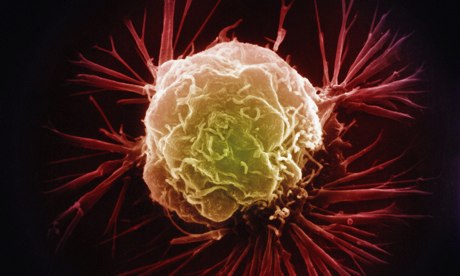
Women's lifestyles, including how heavily they drink and how many children they have, are the reason why white females have higher rates of breast cancer than black and south Asian women, a new study finds.
The data comes from the Million Women Study, run by Oxford University, a survey large enough to make valid comparisons between the ethnic groups.
The study is investigating women's cancers and other health issues. More than a million white women between the ages of 50 and 64 were recruited between 1996 and 2001, alongside nearly 6,000 south Asian women and almost 5,000 black women.
The study, published in the British Journal of Cancer, found that south Asian women were 18% less likely to get breast cancer than the white women, while the black women had a 15% lower risk.
However, the differences between the groups were almost entirely accounted for by individuals' lifestyles.
Having more children and breastfeeding for longer is known to help protect women from breast cancer; a finding the Million Women Study, which is jointly funded by Cancer Research UK and the Medical Research Council, had already demonstrated. The white women had an average of 2.1 children, while the south Asians had 2.7 and the black women 2.9.
Far higher proportions of south Asian women (85%) and black women (83%) had ever breast fed compared with the white women (69%).
And, in relation to another risk factor, white women were more likely to have a close relative with breast cancer (10%), compared with black women (7%) and south Asian women (5%).
Some of these were factors that women could either do nothing about or were unlikely to want to change. Few modern women with careers would want to turn the clock back and have large families. Research also showed that the longer a woman spent breastfeeding the greater her protection. However breastfeeding for more than six months was considered impractical by most women wanting to return to work.
In the survey's look at alcohol consumption – a risk factor that is alterable – 75% of the south Asian women were non-drinkers, compared with 38% of black women and only 23% of white women.
The use of hormonal therapy during menopause has also been shown to increase risk – 22% of south Asian women and 29% of black women were taking HRT, compared with 35% of the white women.
Being overweight or obese was the only risk factor that appeared lower for the white women than in the black women (though it was almost the same for the south Asians). All the groups had an average BMI that was over 25, a level that doctors consider overweight.
Most of the black and south Asian women in the study were first-generation immigrants. The authors say that the lifestyles of their daughters and granddaughters could well change, which could bring increased breast cancer risks.
Toral Gathani, author of the study, from Oxford University, said: "It's important for women of all ethnic groups to understand what are the modifiable risk factors for breast cancer, such as obesity and excessive alcohol consumption, and to take measures to reduce their risk."
Julie Sharp, Cancer Research UK's head of health information, said: "Women can reduce their risk of breast cancer by cutting down on alcohol, keeping a healthy weight by eating a balanced diet and keeping active.
"If women notice any changes to their breast such as lumps, any skin or nipple changes, or changes in their size, shape or feel they should tell their doctor straightaway. It's probably not cancer, but if it is, getting it diagnosed as early as possible gives the best chance of survival." An early diagnosis, she added, would give the best possible chance of survival.

